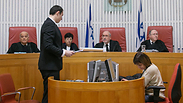
'Supreme Court is discussing a purely political dispute under the cover of freedom of expression'
צילום: אוהד צויגנברג
Anti-boycott dispute is purely political
Op-ed: The State of Israel has the right to combat boycotts, but are the settlements included in this framework?
The freedom of speech, or freedom of expression as it is usually called, is not protected as part of Basic Law: Human Dignity and Liberty. In fact, it is not even mentioned in this law. This did not stop the activist court from ruling that it is included in the term "human dignity," and therefore it believes it is authorized to annul laws violating this right. And so we got to see a panel of nine judges dealing with the legality of the legislation in regards to a boycott of Israel and the territories it controls.
The freedom of expression, in its clean form, deals with the right to speak and to try to convince people on facts, beliefs, theories and a point of view. This freedom, like any other freedom, is subject to restrictions. There are bans on libel, invasion of privacy, racist statements, and in different countries there is also a ban on Holocaust denial.
When the expression exceeds an attempt to merely convince but calls for action, we move into an area which is beyond freedom of expression and relates to the legality and morality of the action in question. If so and so asks a criminal to murder or beat up his neighbor, there is no question of freedom of expression. So and so did not only speak but also called for action, and because it is illegal he will be considered an accomplice or solicitor of the criminal.
So what is the legal position on a boycott call? It appears to be a complicated issue. Sometimes it is completely wrong and should be fought, and sometimes it is not only tolerable but even encouraged. A consumer boycott of a company which overcharges or treats its employees unjustly is considered a legitimate step in the battle against it. On the other hand, a commercial boycott of a monopolist against a retailer with the aim of convincing him not to sell competitors' goods is an unacceptable act and may even be illegal.
As for a politically-motivated boycott, it turns out that it depends quite a lot on the point of view. As we know, Arab countries imposed an economic boycott on Israel, which caused us huge damage. Many international companies refused to trade with Israel and do business in Israel. This unacceptable boycott was largely undermined (even before the peace treaties with Egypt and Jordan) thanks to American legislation which banned American companies from cooperating with it.
A completely different approach was taken in regards to the boycott against South Africa in the apartheid era. This shows that the battle against boycotts and in favor of freedom of expression is subject to the purpose of the boycott and the political stance of its advocates or opponents.
As for the question being discussed by the Supreme Court at the moment, I believe that the overwhelming majority among us would not disagree with the State of Israel's right to combat, through suitable legislation as well, a boycott which people are seeking to impose on the state and on its residents (although we can always ask if one step or another is sensible or efficient). But the question raised is whether the settlements are also included in this framework.
Here we get caught in the deep political dispute between the settlers and their supporters and wide parts of the public that oppose them. As far as the settlers are concerned, the fate of the settlements equals the fate of Israel. They and the State of Israel are one, and any battle Israel wages against the boycott should also apply to the territories and the business taking place in them.
The right-wing government (which has come to terms with the European distinction between the territories and Israel, having no other alternative) has accepted this stance, which is expressed in the anti-boycott law being discussed in the High Court right now. Those who oppose the settlements see it differently, and there are those among them who in addition to not wanting to see themselves as being a "in the same boat" with the settlers, are willing to boycott the settlement themselves.
Now the Supreme Court is required to decide on this dispute, which is a pure political dispute that has been covered this time with the banner of freedom of expression.










